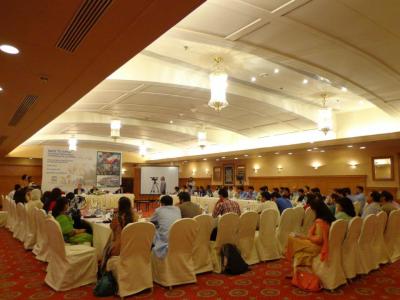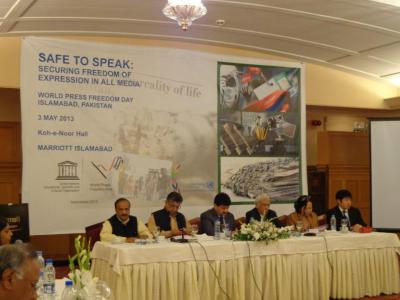
I was reading a really good book, had a final project due and a couple of other assignments which really needed my attention. Now as the Fridays are off, i decided to complete all my tasks that are due over the long weekend. My friend texts me asking me to attend this seminar “Save to Speak”. Now there is a problem and Oh i have a solution “Work Can Go to hell”.
This is how I got to attend the seminar “Safe to Speak: Securing freedom of Expression in All Media”, organized by UNESCO to celebrate the World Press Freedom day on 3rd May 2013.

The session started off with opening remarks from Kazuo Tasse, UNIC director, who welcomed all the participants and said “world press freedom day is a tribute to those media professionals who have risked or lost their lives on the line of duty”. Kazuo Tasse also said that “Journalism is necessary for the development of any country”.
“Freedom of expression provides conditions for protecting and promoting human rights” said Timo Pakkala, resident coordinator UN in Pakistan. He highlighted that more than 600 journalists have been killed in Pakistan in the past ten years and sadly every 9 out 10 cases go un-addressed. He said, “The theme of this year represents United Nation’s strong commitment to the cause, ‘safe to speak’ and this goal can only be achieved by creating media awareness”.
The opening of the forum session struck a debate about the freedom of media between Muhammad Azam (Additional secretary to Minister of Information) and a well-known TV Anchor – Hamid Mir with Zia-u-din (a very prominent Pakistani journalist) by his side. “Impression that media is free, is good, but it is only valid as far as major cities (like Islamabad and Lahore) are concerned – Freedom of expression in Pakistan is partial” said Hamid Mir, a senior anchor-person from Pakistan Television broadcast.

From Left to Right: Muhammad Azam, Murtaza Solangi, Hamid Mir and Zia-u-din
During the session Hamid Mir made this very clear that if we are telling the truth, it means we are risking our lives for that; we don’t get our freedom on a plate. He said “It is a myth that media is free”. Mir got quite enthusiastic while explaining the role of media and said that “media is not a reformer, it is an informer”.
The panel discussion was quite useful and informative. Students from different universities asked questions, many of those questions revolved around the future of journalism in Baluchistan and how this situation can be improved. I was quite surprised to see that none of the speakers were able to provide the satisfactory answer to this question, though, the additional secretary to minister of information, Muhammad Azam, completely blamed the situation on “Jihadi groups, Taliban’s and Militants”.
On the other hand, Hamid Mir and Zia-u-din totally disagreed with Muhammad Azam’s statement and blamed the state actors for the situation in Baluchistan. “It is not only the fault of Taliban or Jihadis most of the time the attacks on journalists are state sponsored” said Hamid Mir
Most of the students believed that UNESCO made quite an effort by gathering media professionals and students at one platform. It allowed them to critically debate about the future of “freedom of expression” in Pakistani media. “On the whole the panel discussion was quite productive” i overheard a student from International Islamic University, Islamabad saying that.
However, being a journalism student I would say that the practice of journalism in Pakistan is biased; organizations have affiliations with political parties, which is quite harmful for fair, objective and unbiased dissemination of information. Freedom in today’s world, is taken as a ‘commodity’, which is absolutely wrong. Freedom is always achieved after years of struggle – so we should value it”

Hi, you have written ‘save to speak’ in fact it is ‘safe to speak’. Kindly make corrections in few locations.
Done, Thank You so much for pointing out!
You are welcome, keep up the good work!
Comprehensive and well-structured. Thanks for sharing it.
I really want to say this to Muhammad Azam, it is time that we should start accepting our mistakes and stop blaming everything on (as he says) “Jihadi groups, Taliban’s and Militants”.